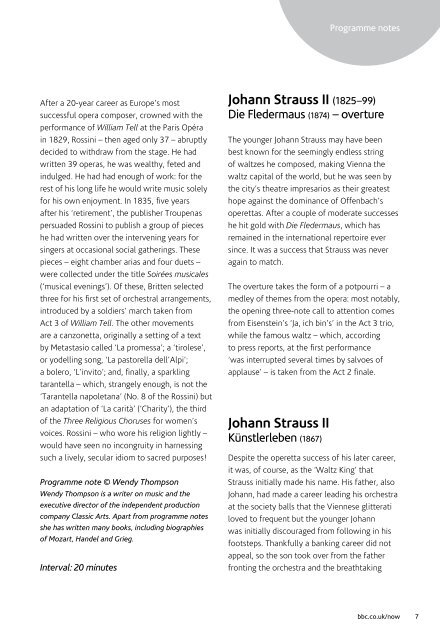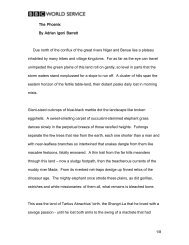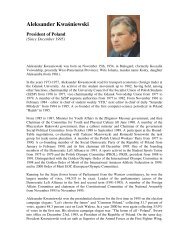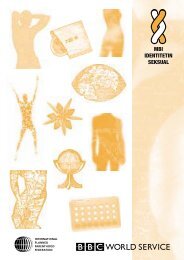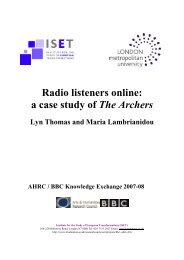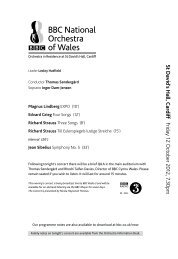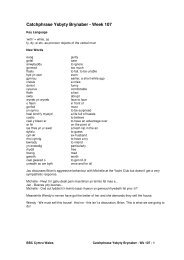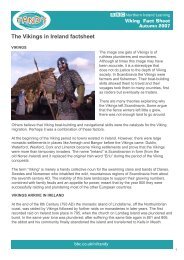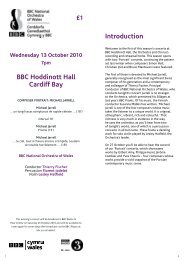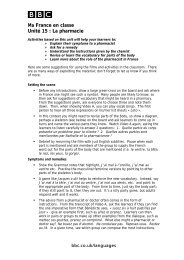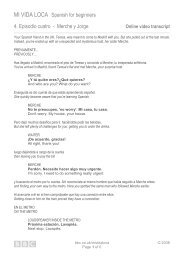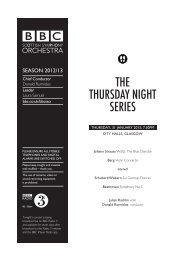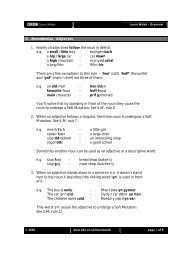Find out more by downloading our programme notes - BBC
Find out more by downloading our programme notes - BBC
Find out more by downloading our programme notes - BBC
You also want an ePaper? Increase the reach of your titles
YUMPU automatically turns print PDFs into web optimized ePapers that Google loves.
Programme <strong>notes</strong><br />
After a 20-year career as Europe’s most<br />
successful opera composer, crowned with the<br />
performance of William Tell at the Paris Opéra<br />
in 1829, Rossini – then aged only 37 – abruptly<br />
decided to withdraw from the stage. He had<br />
written 39 operas, he was wealthy, feted and<br />
indulged. He had had enough of work: for the<br />
rest of his long life he would write music solely<br />
for his own enjoyment. In 1835, five years<br />
after his ‘retirement’, the publisher Troupenas<br />
persuaded Rossini to publish a group of pieces<br />
he had written over the intervening years for<br />
singers at occasional social gatherings. These<br />
pieces – eight chamber arias and f<strong>our</strong> duets –<br />
were collected under the title Soirées musicales<br />
(‘musical evenings’). Of these, Britten selected<br />
three for his first set of orchestral arrangements,<br />
introduced <strong>by</strong> a soldiers’ march taken from<br />
Act 3 of William Tell. The other movements<br />
are a canzonetta, originally a setting of a text<br />
<strong>by</strong> Metastasio called ‘La promessa’; a ‘tirolese’,<br />
or yodelling song, ‘La pastorella dell’Alpi’;<br />
a bolero, ‘L’invito’; and, finally, a sparkling<br />
tarantella – which, strangely enough, is not the<br />
‘Tarantella napoletana’ (No. 8 of the Rossini) but<br />
an adaptation of ‘La carità’ (‘Charity’), the third<br />
of the Three Religious Choruses for women’s<br />
voices. Rossini – who wore his religion lightly –<br />
would have seen no incongruity in harnessing<br />
such a lively, secular idiom to sacred purposes!<br />
Programme note © Wendy Thompson<br />
Wendy Thompson is a writer on music and the<br />
executive director of the independent production<br />
company Classic Arts. Apart from <strong>programme</strong> <strong>notes</strong><br />
she has written many books, including biographies<br />
of Mozart, Handel and Grieg.<br />
Interval: 20 minutes<br />
Johann Strauss II (1825–99)<br />
Die Fledermaus (1874) – overture<br />
The younger Johann Strauss may have been<br />
best known for the seemingly endless string<br />
of waltzes he composed, making Vienna the<br />
waltz capital of the world, but he was seen <strong>by</strong><br />
the city’s theatre impresarios as their greatest<br />
hope against the dominance of Offenbach’s<br />
operettas. After a couple of moderate successes<br />
he hit gold with Die Fledermaus, which has<br />
remained in the international repertoire ever<br />
since. It was a success that Strauss was never<br />
again to match.<br />
The overture takes the form of a potp<strong>our</strong>ri – a<br />
medley of themes from the opera: most notably,<br />
the opening three-note call to attention comes<br />
from Eisenstein’s ‘Ja, ich bin’s’ in the Act 3 trio,<br />
while the famous waltz – which, according<br />
to press reports, at the first performance<br />
‘was interrupted several times <strong>by</strong> salvoes of<br />
applause’ – is taken from the Act 2 finale.<br />
Johann Strauss II<br />
Künstlerleben (1867)<br />
Despite the operetta success of his later career,<br />
it was, of c<strong>our</strong>se, as the ‘Waltz King’ that<br />
Strauss initially made his name. His father, also<br />
Johann, had made a career leading his orchestra<br />
at the society balls that the Viennese glitterati<br />
loved to frequent but the younger Johann<br />
was initially disc<strong>our</strong>aged from following in his<br />
footsteps. Thankfully a banking career did not<br />
appeal, so the son took over from the father<br />
fronting the orchestra and the breathtaking<br />
bbc.co.uk/now 7


